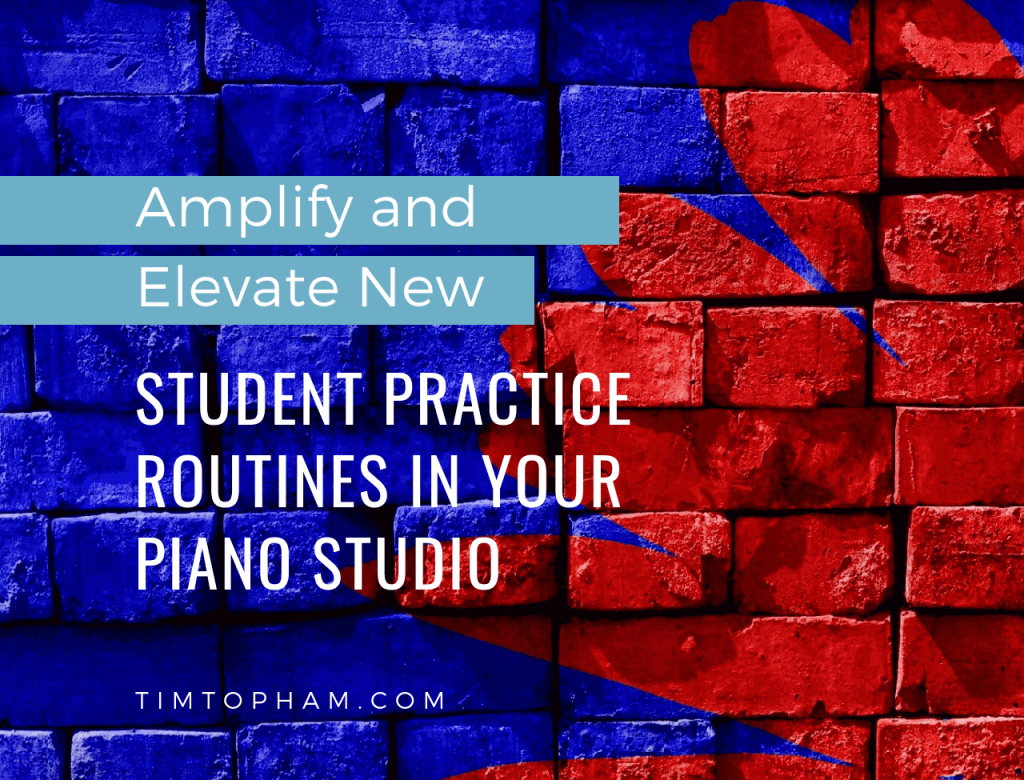For most piano teachers, September brings a whole slew of new piano students through the doors. This is both an exciting and a super busy time in a piano teacher’s calendar.
It’s also an opportunity to start fresh – to make practice happen from the get-go.
In my experience, students that practise regularly in the beginning carry that forward, and students that don’t…don’t. The families who don’t get the practice going in the first weeks are the ones that have parent-student battles later on.
These students come to see piano practice as a chore and something that drags them away from other activities.
That’s why I believe it’s so important to establish a practice routine in the beginning weeks and months with all new students.
RELATED: How to teach beginner students with NO BOOK for 10 weeks [Free lesson plans]
So how do we get new students into a practice routine?
It starts at the first meeting.
If you’re not already doing meetings with all new students before starting lessons, I strongly suggest you start. They provide such a wonderful opportunity to establish expectations before it even becomes an issue.
At the first meeting with a new student, I always talk to the parents about their role in the child’s piano studies. I tell the parent it is their job to remind their kid to practise and to support them in reading and understanding assignments.
Then I turn to the student and say that while it’s the parents’ job to remind them to practise, it’s their job to go to the piano when they are reminded. There should never be any “nagging” required.
In the beginning, all I want them to do is establish a piano practice routine. I don’t care if…
The only thing that matters for the first semester is that they get to the piano each and every day in a way that fits into their daily habits. We’ll make it efficient later.
If you are looking at making piano practice more efficient for students who are further down the track, I suggest you read The Practice Revolution by Philip Johnston and/or my own book The Piano Practice Physician’s Handbook.
If my student doesn’t leave the first few lessons dying to go home and show mum and dad what they’ve learnt then I’ve done something wrong.
Of course, I want them to feel that way every week. But especially in the beginning.
How can we make sure students feel excited every time they walk out that door?
The first one is easy. All you need is the right material.
I love using Piano Safari and Piano Pronto books in my studio because (in different ways) they get to real music straight away.
Piano Safari incorporates rote pieces so that students get to explore the whole piano and are not restricted by what they can read in the beginning. I could go on and on about why I love Piano Safari but if you want more on that I suggest you watch this video where I summarise the main benefits of this method. You can also listen to Tim’s episode with the creators of Piano Safari here.
Piano Pronto jumps straight into on-staff reading and uses a chordal approach to the left hand so that students can play rich harmonies fairly early on in their studies. Many students also love that the tunes are familiar (folk and popular classical) so that they know when they’re getting it right and get more satisfaction from their playing.
One of the biggest goals for my teaching, and something I need to keep reminding myself each and every day, is that I want every student to leave their lesson feeling competent.
I think this quote from Frances Clark says it very well:
“A student is almost always motivated to practice if he leaves his lessons feeling capable.”
It sounds like such a little thing but it can have a massive impact on your teaching if you really make this your goal.
When you want a student to leave the lesson feeling capable, competent and confident you need to structure things carefully to make this happen.
For example, if you review the practised pieces at the start of the lesson and only get to new things at the end – they do not get to feel confident with the new material. A new piano student needs much more practice with you in the lesson.
Tweaks like moving new pieces to the start of the lesson and reviewing them several times throughout can make a big difference in the mood your student is in when they leave your studio, and therefore how excited they are to practise at home.
If you focus on the these three things that I’ve discussed in this article for the first semester with a new student, you can’t go far wrong.
Let me know what you think about these priorities and whether you have different ones in the comments below.

Emma says:
Great article! This course helped me improve myself and raise my costs so much – https://bit.ly/2DJxLCM !